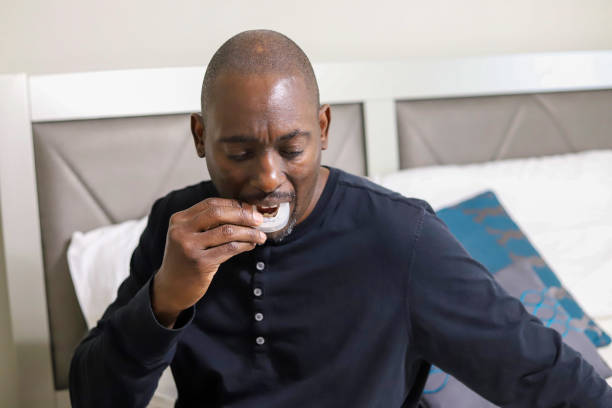Full or partial dentures are a practical and affordable option to enhance your appearance and oral health if you are losing teeth due to aging, trauma, or gum disease.
Unless otherwise instructed by a dental professional, dentures should be taken out and kept in a cleaning solution while you sleep in order to best maintain your dentures and keep your gums healthy. For the first few days, it’s okay to sleep in your dentures—your dental team may even recommend it.1,2 Once your mouth has adjusted to your dentures, you should remove them each night before sleeping.
Read on to learn the best practices of when to wear dentures and what issues can occur if you wear them to sleep.
Can You Sleep With Dentures?
The answer to the question of whether you should wear your dentures to bed is probably not. Your dentures may boost your confidence and make you feel better about your mouth.
When it comes to sleeping in your dentures it’s recommended that you should take them out at night and give your gums a rest. It’s still best to take your partial dentures out, even if you’re wondering if you can sleep with them in. It’s best to err on the side of caution because problems can arise with any type of denture.
According to studies, wearing dentures while you sleep increases your risk of contracting diseases and conditions like pneumonia as well as oral health problems like plaque buildup on your gums and tongue, gum inflammation, and bad breath.
Additionally, if you don’t remove your dentures at night, brush your teeth, and take care of your gums, you’re encouraging the growth of bacteria and fungi in your mouth that can irritate your gums and cause bad odors. So in answer to the question of ‘can you wear false teeth to bed,’ the answer is that you should avoid it if you can.
The Benefits of Not Wearing Dentures at Night
Helps Prevents Bone Loss.
The pressure put on your gums and the bone underneath the dentures can accelerate bone resorption.
Helps Maintain a Tight Fit.
Your dentures may become looser than usual as a result of bone loss and gum resorption, increasing the risk of slippage and limiting the variety of foods you can eat.
Stops Bacteria Growth.
The place where your dentures and gums meet is the perfect spot for bacteria to grow, which leads to bad morning breath, and can eventually result in gum disease. You deny your gums a chance to rest without bacteria by wearing your dentures at night.
Helps Prevent Gum Inflammation.
Sleeping with dentures can impair saliva flow and obstruct the flow of saliva, which can lead to a condition known as denture stomatitis. Thrush, also known as denture stomatitis, is a condition where the area under your dentures can become red and swollen, resulting in infected, inflamed gums.

Dangers of Sleeping in Your Dentures
Gum Inflammation
Your mouth’s most delicate tissues, such as your gums, are easily irritated by things like dentures and frequently need a rest.
Therefore, it’s crucial to take out your full or partial dentures before going to bed. If you don’t, your gums might swell up and hurt, making it difficult to wear your replacement teeth the next day.
Increased Risk of Pneumonia
You run a higher risk of developing pneumonia if you sleep with dentures in. Actually, if you are 85 years old or older, your risk DOUBLES.
Your mouth picks up a lot of moisture while you sleep every night. If you are wearing your dentures, it becomes difficult to swallow and the fluid builds up.
One outcome that might occur is that the fluid is drawn into your lungs, raising your risk of contracting a respiratory illness like pneumonia.
Plaque Buildup
Plaque is a sticky film that develops on your teeth and dentures as a result of bacteria accumulating on their surfaces.
Because partial dentures restrict saliva flow on your natural teeth while you sleep, oral bacteria (plaque) can accumulate and infect your gums. Additionally, this can weaken and hasten the degeneration of your dentures.
Mouth Sores
Your gum tissues require time to breathe, as was already mentioned. They become infected, and swollen, and can result in uncomfortable mouth sores if they are not given enough rest.
You may completely stop wearing your dental implants if you have mouth sores or inflammation, which makes wearing dentures very uncomfortable.
How to Care for Your Dentures When You Are in Bed?
While we have addressed the question of whether can you wear dentures to bed, the question now remains of what you should do with your dentures while you are sleeping! Placing dentures overnight can cause bacterial growth and infection problems. Even though you won’t be sleeping with your dentures, you still need to take care of them overnight.
Having a great daily cleaning routine in place is essential for maintaining the health of your dentures. To ensure that your dentures are clean, fresh, and prepared for your day when you put them back in the following morning, you should remove any plaque or bacteria from them over the course of the night.
Your cleaning routine should include:
• Brushing your dentures to clean them
• Soaking your dentures overnight in warm (not hot) water
• Rinsing your dentures in the morning before you put them back in your mouth
Final Thought
If you take care of your dentures, they ought to last for many years. When caring for your dentures, use products specifically made to clean and disinfect dental appliances.
Also, keep in mind that you shouldn’t leave your dentures overnight; instead, remove them, clean them, and keep yourself free of bacteria and infection by doing so.
